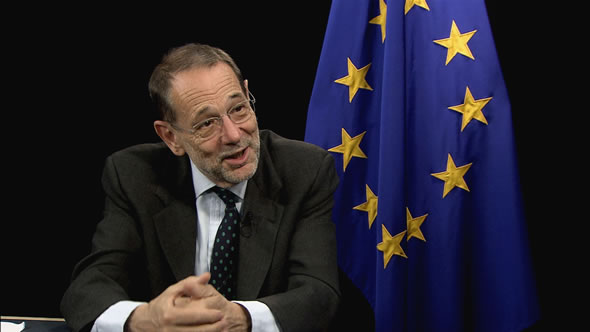Globalizing European security

Former EU High Representative for Foreign and Security Policy, Secretary-General of NATO, and Foreign Minister of Spain. He is currently President of the ESADE Center for Global Economy and Geopolitics and Distinguished Fellow at the Brookings Institution.
Global security - a safe and peaceful environment free of conflict - is a public good. In other words, all of the world's citizens and countries benefit from it, regardless of whether they contribute to supplying it. Given this, free riders (those who enjoy the benefits of the good without investing in its provision) are likely to be plentiful. But, when it comes to global stability, the world simply cannot afford a free-riding Europe.
To be sure, given Europe's violent past, the European Union's greatest contribution to international security has been to ensure stability in its own region. Today, nearly a century after the outbreak of World War I, peace and stability are firmly entrenched in Europe.
Other regions, however, are volatile and unstable. For example, strategic tinderboxes like the Middle East and Southeast Asia lack the regional security structures with which Europe is endowed. The Middle East's geographic proximity means that Europe cannot ignore it, while it would be folly to ignore Southeast Asia's economic weight.
The EU is the world's largest economy, with annual GDP of more than €15.5 trillion ($21.3 trillion), and its greatest trading power, accounting for 20% of world trade. Clearly, the EU should aspire to increase its contribution to global security beyond maintaining peace among its member states. This is no time for Europe to rest on its laurels - particularly with the United States moving to extract itself from two wars and confronting isolationist urges.
Enter this month's European Council meeting: on December 19-20, heads of state and government from the EU's 28 member countries will convene to discuss the Common Security and Defense Policy (CSDP). Throughout the discussions, a forward-looking, ambitious vision must be maintained in order to bring a truly global European security strategy into view. Unfortunately, in national governments and EU institutions alike, the leadership needed to realize this strategic vision is lacking.
The summit will face several hurdles from the outset. For starters, the ongoing consequences of simultaneous economic, political, and institutional crises continue to determine the European agenda. Realizing a long-term vision is more difficult than ever when so many short-term imperatives - reviving growth and employment, winning elections, and re-engaging a distrustful public amid growing populist sentiment, to name just a few - materialize simultaneously.
In this environment, deepening Europe's defense and security integration would appear to be low on the list of priorities. But the opposite is true: further development of the CSDP is essential to the survival of the European way of life.
This month's Council will lay the foundations for the CSDP's further development by addressing three main topics: operational efficiency, defense capabilities, and the state of the European defense industry. If the EU's defense and security policy is to be strong, global, and effective, it is imperative to take advantage of both the specialization and pooling of member states' technology and resources.
As national budgets shrink under the effects of austerity, the EU should review member states' spending on security. It is senseless for each national government to invest limited resources identically. This moment holds potential: spending cuts could be transformed into an opportunity to coordinate and integrate Europe's defense industry, thus maximizing overall efficiency.
The objective must be to boost European security integration (in its broadest sense), lifting Europe to the forefront of global security. As member states advance along this path, propelled forward by technological and operational excellence and innovation, they will find avenues to eliminate unnecessary spending and optimize resource use.
Europe's defense industry will not be able to make progress without a well-functioning market - open, transparent, and with equal opportunities for all European suppliers. Advances in the defense industry lead to significant positive externalities, such as civil-military synergies and investment in research and development, which is fundamental to growth, innovation, and future competitiveness.
A critical component in the coordination and proper functioning of Europe's security and defense policy is the European Defense Agency. At the upcoming summit, leaders should reiterate the importance of the EDA, whose budget has remained frozen at the insistence of certain member states.
It would be irresponsible to treat December's Council meeting as just another summit. Europe and an increasingly unstable world need a viable framework for global security. A fully developed CSDP - itself the cornerstone of further European integration - must be a fundamental component of such a system.
Here we are to serve you with news right now. It does not cost much, but worth your attention.
Choose to support open, independent, quality journalism and subscribe on a monthly basis.
By subscribing to our online newspaper, you can have full digital access to all news, analysis, and much more.
You can also follow AzerNEWS on Twitter @AzerNewsAz or Facebook @AzerNewsNewspaper
Thank you!
